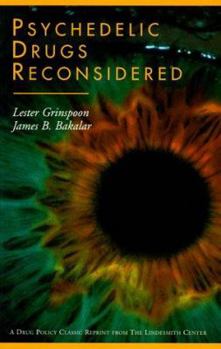Psychedelic Drugs Reconsidered
Select Format
Select Condition 
Book Overview
No Synopsis Available.
Format:Paperback
Language:English
ISBN:0964156857
ISBN13:9780964156852
Release Date:June 1997
Publisher:Lindesmith Center
Length:409 Pages
Weight:1.55 lbs.
Dimensions:1.1" x 6.0" x 9.2"
Customer Reviews
2 ratings
LSD: Gnosis or Psychosis?
Published by Thriftbooks.com User , 23 years ago
This book is a call for further scientific research on LSD (despite the bad stigma that it is given by the "establishment") and for loosening the restrictions on those scientists who want to research the effects of the drug. For one thing, the authors state that it is currently illegal for doctors to use the drug for therapeutic purposes. The drug is available only for research purposes, and as I'm sure you can imagine, there is a lot of red tape involved. So, that is the basic problem that scientists who are interested in LSD are facing. Half of the book is devoted to what I'd call the history of psychedelic drug use, and the other half to the effects of psychedelic drugs, with some of the legalities involved thrown in for good measure. As far as the history goes, there is good reason to believe that psychedelic drugs have been around for a long time, and will continue to be used for a long time. And, as far as the effects of these drugs are concerned . . . well here we get to the "good stuff". First, I think the book is somewhat dangerous, because despite what you may have been told, LSD is not a panacea. Some psychiatrists (such as Stanislav Grof) will have you believe that the drug can regress you to the time of your birth, allowing you to resolve all the existential issues in your life, and then possibly regress you further into other "far out" realms . . . where there's just no law and order, man (e.g. imagine you consciously identifying with the sperm cell that was you, this kind of nonsense is abundant in Grof's work, see his _LSD Psychotherapy_). Nevertheless the effects of the drug are profound and religiomimetic. I'm really unable to speak about a lot of this stuff because I've never taken the drug (thank God), and have never really seen anyone else under the influence of it. And, my suspicion is that while the drugs do induce genuine experiences, they aren't as meaningful as "genuine religious experiences" (whatever that might mean). So, I tend to side with Mircea Eliade and the Catholic scholar, R. C. Zaechner. Nevertheless it is clear to me at least that much is yet to be learned from these drugs and that further "controlled" research needs to be done. In any event, the stuff makes for fascinating reading, and it raises a lot of philosophical questions.
Informative, and this book needs to have stars.
Published by Thriftbooks.com User , 25 years ago
Reluctant as I am to write a review, noticing that this fine publication has gone unreviewed demands that I take some initiative. It is direct, well-written, provides sound cultural and scientific analysis and is truly enlightening. The issue of drugs and their relationship to 21st century society must be breached and its publication is a step in the right direction. A good overview of the impact the psychochemicals have had on 20th century western thought and popular culture, with proper and suitable (not condescending or patronizing) presentations of such thinkers as Huxley, Leary, McKenna, et al. If you possess interest in the subject, be it casual or serious, this book will deliver. Let's collectively wake up.





